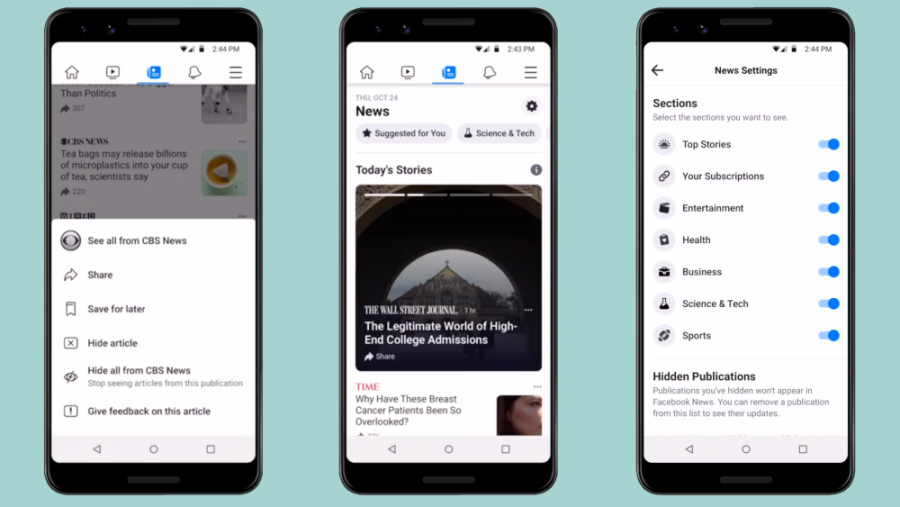Facebook’s New Feature Sparks Controversy
November 3, 2019
Last Friday, Facebook unveiled “Facebook News” with the aim of reducing the site’s notoriously abundant misinformation. The feature has only been made available to 200,000 testers in the U.S., but already, it has sparked controversy, particularly over the platform’s decision to include headlines from Breitbart News on the tab.
When released to the public, “News” will feature headlines curated both by journalists and an algorithm—a significant switch for Facebook, which has long argued against human intervention on its site. Users will interact with the interface by tapping on the headlines, which will lead them to credible external sources, including the New York Times, the Wall Street Journal, Buzzfeed, and the LA Times.
Articles will continue to appear on users’ News Feed, but according to Facebook’s Campbell Brown and Mona Sarantakos, the Facebook News tab will give users “more control over the stories they see, and the ability to explore a wider range of their news interests, directly within the Facebook app.”
Facebook’s hope is that this new feature could be a useful tool in combating the spread of misinformation for which it has become infamous. Mark Zuckerberg, CEO, spoke for the company saying that “we think that this is an opportunity to build something quite meaningful… we’re going to have journalists curating this, we are really focused on provenance and branding and where the stories come from.”
This is not Facebook’s first venture into journalism. In 2014, it launched the ill-fated “Trending” page, only to shut it down after four years amidst concerns about bias against conservatives and the propagation of fake news. And while since then, the company has not been able to shake its reputation as a vehicle for misinformation, 43% of Americans still report getting their news from Facebook, which is why the credibility of sources included on the “Facebook News” tab is of concern to many.
Facebook has drawn much criticism in particular for its inclusion of headlines from Breitbart News, a far-right outlet with dubious reliability. Previously headed by former White House chief strategist Steven Bannon, it has a history of incendiary commentary and blatantly misleading reporting, particularly regarding Democrats and other critics of Trump. It also has close ties to the Trump administration, and many of its former employees have gone on to work in the White House.
Facebook, however, denies any wrongdoing. As Brown explains, “all the content on Facebook News today meets [our] standards… If a publisher violates our standards by posting misinformation or hate speech on our platform, they will be removed from Facebook News.” Furthermore, Facebook has claimed that it will not pay Breitbart for its headlines, while it plans to pay other news outlets for theirs.
Within Hingham High School, students view the new feature with mixed feelings. Sophomore Mimi Jiang-Yu explained that “the news section is good in terms of bringing people news to an app they already… use,” but cautioned that “people should still be wary of fake news.”
Ella Niehoff, also a sophomore, pointed to Facebook’s history to express a similar sentiment, explaining how Facebook “had no set regulations” and “contained flaws, such as the lack of basic ethics for employees to follow.” Niehoff added that “although Facebook is very successful today, originally Facebook had many struggles,” and expressed concern that these may resurface in Facebook News.
Zuckerberg has said that he hopes the page will have 20 to 30 million users within a few years. Currently, it remains in testing, and it is unclear when it will be released to a wider audience.


































